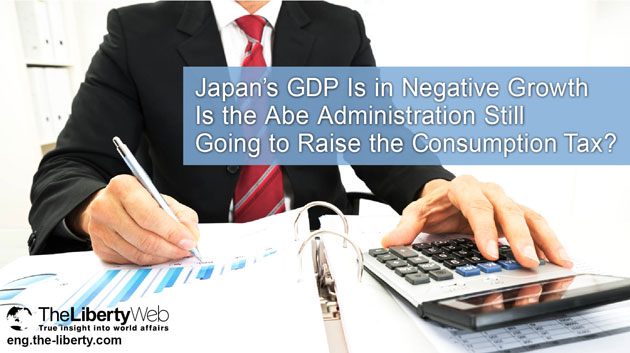Japan’s GDP Is in Negative Growth
Is the Abe Administration Still Going to Raise the Consumption Tax?
Is it really necessary for the Japanese government to raise the consumption tax at any rate?
On February 15th, the Cabinet Office announced that Japan’s gross domestic product (GDP) for the October-December period of 2015 shrank 0.4 percent, experiencing an annualized 1.4 percent drop.
Japanese Prime Minister Shinzo Abe stressed that foreign economic trends including concerns over the slowdown of the Chinese economy have contributed to Japan’s sluggish economy. As for an increase in the consumption tax rate, he went no further than to say, “The consumption tax hike from 5 to 8 percent has dented consumer spending bigger and longer than expected. We must try hard to win the public’s understanding about the sales tax increase in consideration of the effects of the tax hike on consumption.”
At the news conference, Chief Cabinet Secretary Yoshihide Suga also stressed again that the tax hike will go off as planned unless the economy is rocked by an extraordinary large shock, something akin to the 2008 subprime financial crisis.
The Impact of the Consumption Tax Increase
The contraction of the GDP owes largely to a decline in consumer spending. Private consumption for the October-December period of 2015 came to an annualized 304 trillion yen ($2.65 trillion) – even below the 305 trillion yen recorded in the April-June period of 2014, just after the sales tax rose to 8%.
The decline in consumer spending has actually dealt a blow to the retail industry. In the February 16th issue of Nihon Keizai Shinbun, Noboru Yamada, the president of Yamada Denki, Japan’s leading electrical appliance store, said, “Consumer confidence hasn’t improved because of uncertainty over the outlook for the economy.” Domestic sales of new autos sank 4.6% from a year earlier in January.
The zero interest rate policy that the Bank of Japan (BOJ) has employed over the years has had no effect, and few people have much hope for the negative interest rate policy because consumer spending that supports the actual economy has decreased and companies have not invested as much as expected. Companies and the public do not spend money, so the BOJ’s monetary policy has turned out to be fruitless.
If the government raises the consumption tax rate from the current 8% to 10% in April of next year, it will have an immeasurable effect on the Japanese economy.
To Learn from Past Mistakes
The consumption tax hike will not increase tax revenue in the long run. Loss-making companies that cannot afford to pay their corporate taxes account to about 70% in Japan. An economic slowdown caused by a consumption tax hike could lead to a further decrease in the number of individuals and companies that can pay taxes. In anticipation of this, the Abe administration decided to adopt the Social Security and Tax Number System to collect the taxes that the government failed to collect so far.
Former Prime Minister Noboru Takeshita resigned after the introduction of the consumption tax. Since that, Japan has been struck in a recession that’s lasted for about 30 years. It is high time to learn from the past failures in the policies for increasing taxes, and to make a definite move toward tax cuts.


![Prosperity Thinking: Developing the Mindset for Attracting Infinite Riches [Paperback] by Ryuho Okawa/Buy from amazon.com](/files/2016/02/160223_amazon.jpg)

















